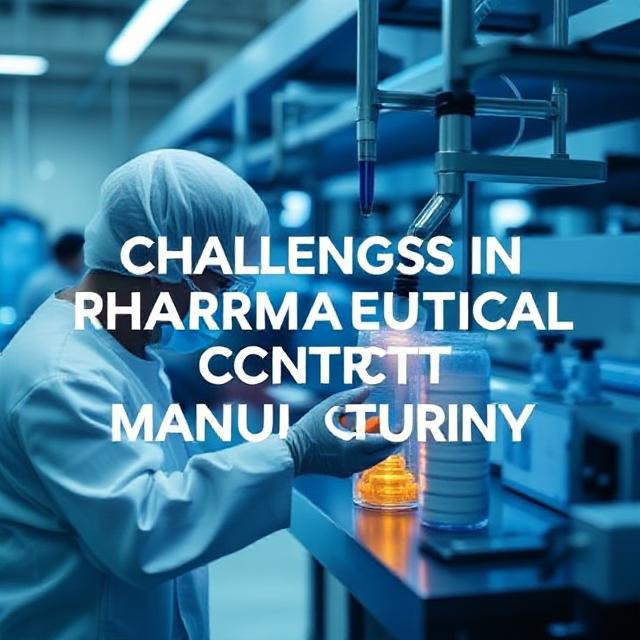
- Insearch Formulation
- January 31, 2025
- 8:02 am
- No Comments
Challenges in Pharmaceutical Contract Manufacturing : An Overview
Pharmaceutical contract manufacturing is an initiative through which enterprises send out the production of their drugs to third-party manufacturers. This approach gives greater flexibility, cost savings, and efficiency to the pharmaceutical company. With the capabilities of Contract Manufacturing Organizations (CMOs) and Contract Development and Manufacturing Organizations (CDMOs), pharmaceutical companies can concentrate on their core activities including drug discovery and selling drugs.
What is Pharmaceutical Contract Manufacturing?
Pharmacological contract manufacturing is a practice in which the various stages of drug production are subcontracted to third parties. They offer a wide range of services, including testing, research, and development of drugs and manufactured goods, ensuring that subsidiary company obligations under internal guidelines are met. For any company looking to cut costs, increase volume, and simplify work processes, it’s an essential activity.
The Role of CMOs and CDMOs
We must know the different characteristics of CDMOs and CMOs thoroughly in pharmaceutical contract manufacturing. A Contract Manufacturing Organization (CMO) is mainly in charge of producing clients’ drugs by formula. They play a pivotal role in guaranteeing the smooth and efficient production of drugs to meet market requirements.
On the other hand, a Contract Development and Manufacturing Organization (CDMO) can offer more exhaustive services. These not only handle production but also participate in the development of drugs. CDMOs work closely with clients and contract research organizations so that the transformation from research to production is as short as possible.
The Pharmaceutical Contract Manufacturing Process
Pharmaceutical contract manufacturing, a remarkably controlled process is divided generally into four steps:
- Blending: Combining raw materials to create a homogenous mixture.
- Coating: Applying a coating to the drug to protect it or control its release.
- Serialization: Assigning unique identifiers to each product to ensure traceability.
- Shipment: Distributing the finished product to various locations.
This movement takes finished goods to various places. However pharmaceutical contract manufacturing facilities implementing these series of steps enjoy state-of-the-art science across all operations, and this enables the drugs produced to meet quality standards which are supra-national while punishing rules set by organizations like IPEC with an iron hand.
"Check Our Third - Party Contract Manufacturing Products List - Click Here"
Regulatory Compliance in Pharmaceutical Contract Manufacturing
Pharmaceutical contract manufacturing must conform to relevant regulatory requirements. This includes strict safety regulations that contracting manufacturers and micro manufacturers must strictly comply with under the regulatory agency, FDA. Quality agreements and adherence to Current Good Manufacturing Practices (CGMP) guidelines are two key components of those regulations. In essence, businesses must ensure that manufacturing processes are under control and that what they churn out at the end conforms with specified quality standards.
Engaging the services of a Contract Development and Manufacturing Organization (CDMO) offers numerous benefits for pharmaceutical companies:
Costs and Risks Lowered: For CDMOS, manufacturing at cheaper prices materials that still meet high purity standards–and lower risk in production health or safety hazards.
Easy Expandability Companies can adjust production to match market needs CDMOs, unlike traditional service providers, provide solutions that grow with your business.
Access to Skills and Technologies: CDMOs are medical research and production professionals with specialist knowledge, and skilled staff operating state-of-the-art facilities all over the world.
Personalized Services That’s Right for You: CDMOs provide services tailored to your specific customers; in this case pharmaceutical companies.
Challenges in Pharmaceutical Contract Manufacturing
Pharmaceutical contract manufacturing is known to provide several benefits; however, it is not free from challenges. The following are some of the common troubles that companies could face.
Quality Control One of the biggest problems that a company experiences with pharmaceutical contract manufacturing and the issue is quality control. When a company decides to outsource the production, it goes away from controlling the whole process of quality assurance. It is dependent on the risk to the contract manufacturer’s reputation and processes. It is not always easy to find a partner who is unvarying in keeping up with the high-quality standards of the pharmaceutical industry.
Finding the Right Partner The next issue of equal importance is the identification and selection of a reliable contract manufacturer with suitable capability and capacity to meet specific requirements. In-depth research and negotiation are the two main steps in the process of finding the correct partner, which can take a lot of time and be very problematic.
Regulatory Compliance Pharmaceutical contract manufacturing regulatory compliance is a common issue in the pharmaceutical industry. The produced items will undergo a lot of regulation which can be quite complex and very expensive. In addition, the level of knowledge, especially, is an essential factor to be considered by contract manufacturers to ensure that their processes and products comply with all Applicable regulations.

Advanced Technologies in Pharmaceutical Contract Manufacturing
The pharmaceutical contract manufacturing process is utilizing more advanced technologies such as artificial intelligence (AI) and machine learning (ML) to increasingly. At various stages of drug development and manufacturing, these technologies are used to optimize natural language processing for process automation. Stakes are improved and more accurate, and the integration of AI and ML helps improve the quality of pharmaceutical products.
The Importance of Pharmaceutical Quality Assurance
Quality assurance is very important in pharmaceutical contract manufacturing. This is because, to achieve high levels of quality assurance, there is a heightened capacity to produce high-quality medication. It entails stringent testing, validation and perpetual monitoring of the manufacturing processes to meet stringent quality standards.
Choosing the Right Pharmaceutical Contract Manufacturer
The outcome of the introduction of a new drug to the market greatly depends on the pharmaceutical contract manufacturer selected. Important factors to consider are the manufacturer’s experience, past performance, record of compliance with the required regulations and standards, and capacity to increase the output. This is because the wrong choice of a partner can lead to a complex and time-consuming development process and further production of low-quality pharmaceuticals.
Pharmaceutical contract manufacturing is a processing service that can help a company enhance its drug production performance. Through working with CMOs and CDMOs, pharmaceutical firms can cut costs, have more capacity and gain knowledge of technical skills. This paper aims at exploring the details of the pharmaceutical contract manufacturing process and the advantages of outsourcing to help companies make the right decisions when developing new drugs and bringing them to the market.
" You May Also Like This : - How to Start a Pharmaceutical Company in India: A Comprehensive Guide 2025 "
FAQs on Pharmaceutical Contract Manufacturing
The process typically involves four fundamental steps:
Blending: Combining raw materials to create a homogenous mixture.
Coating: Applying a coating to the drug to protect it or control its release.
Serialization: Assigning unique identifiers to each product to ensure traceability.
Shipment: Distributing the finished product to various locations.

